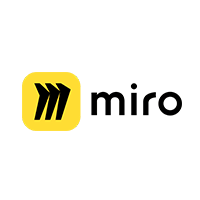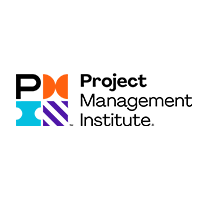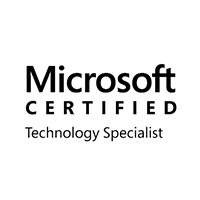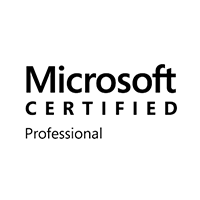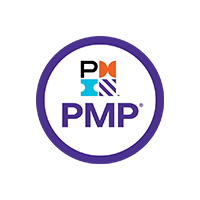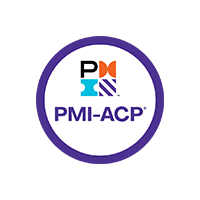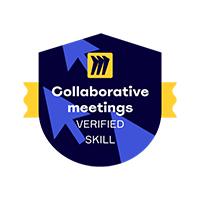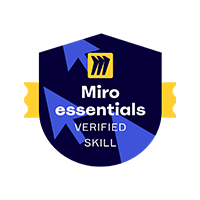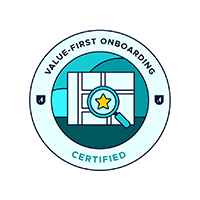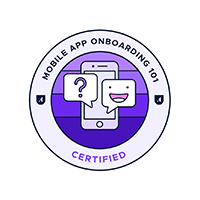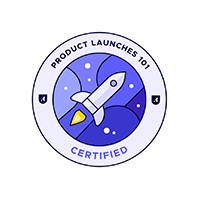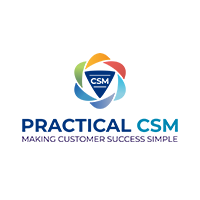Efficient eCommerce Website Development -
Multiply Your Income in 2025
The Key Features of the Package
WooCommerce WordPress website We build your eCommerce website using WordPress and WooCommerce, a popular choice for online stores. This lets you easily manage your rental business online.
Useful modules under the hood Your website will come with everything you need: forms to get in touch with you, a gallery to display what you offer, sliders for engaging visuals, and more.
Various Design Solutions You can choose between using a ready-made design or having us create a unique look just for you. Either way, your site will reflect your business's style.
Responsive and SEO-friendly Our designs are mobile-friendly and optimized for search engines, meaning your site will look good on any device and be easy to find online.
Stripe and PayPal payment gateways We include secure payment options through Stripe and PayPal, ensuring easy and safe transactions for your customers.
Video instructions We also offer video tutorials for managing your site, and our team is always ready to help if you need further assistance.
From 4,170 $3,750 /website
Our Experience & Certification
Our Experience
Our Certification
Our eCommerce Projects
Our team will ensure professional brand representation and successful e-commerce operation of your website
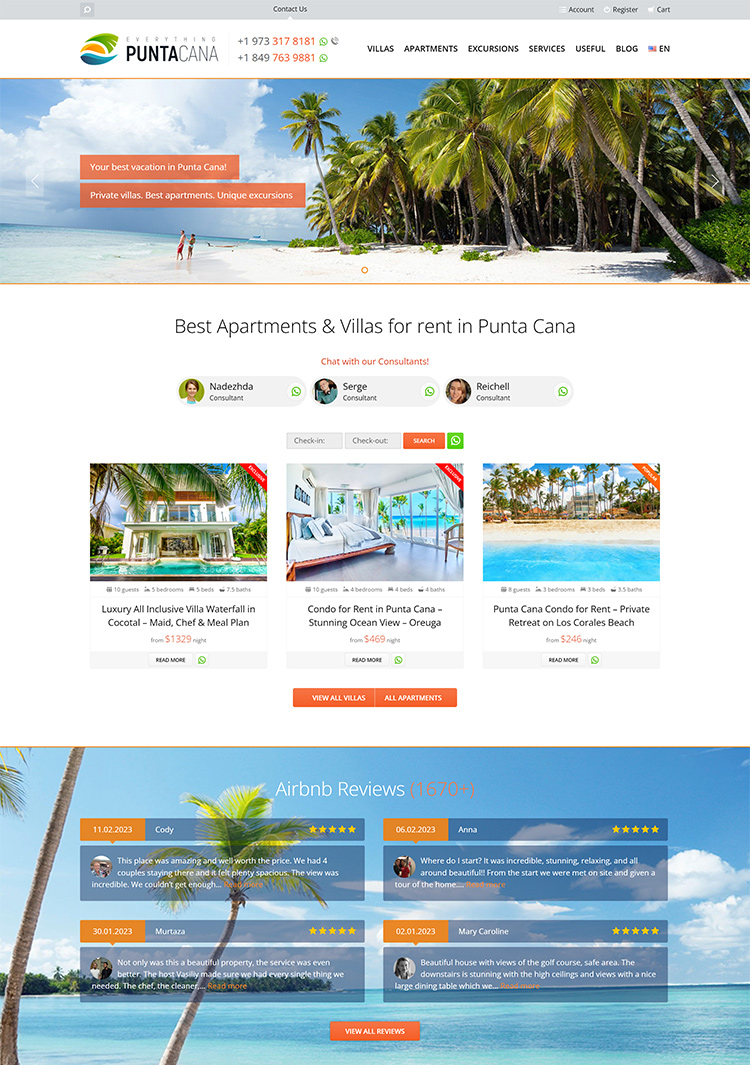
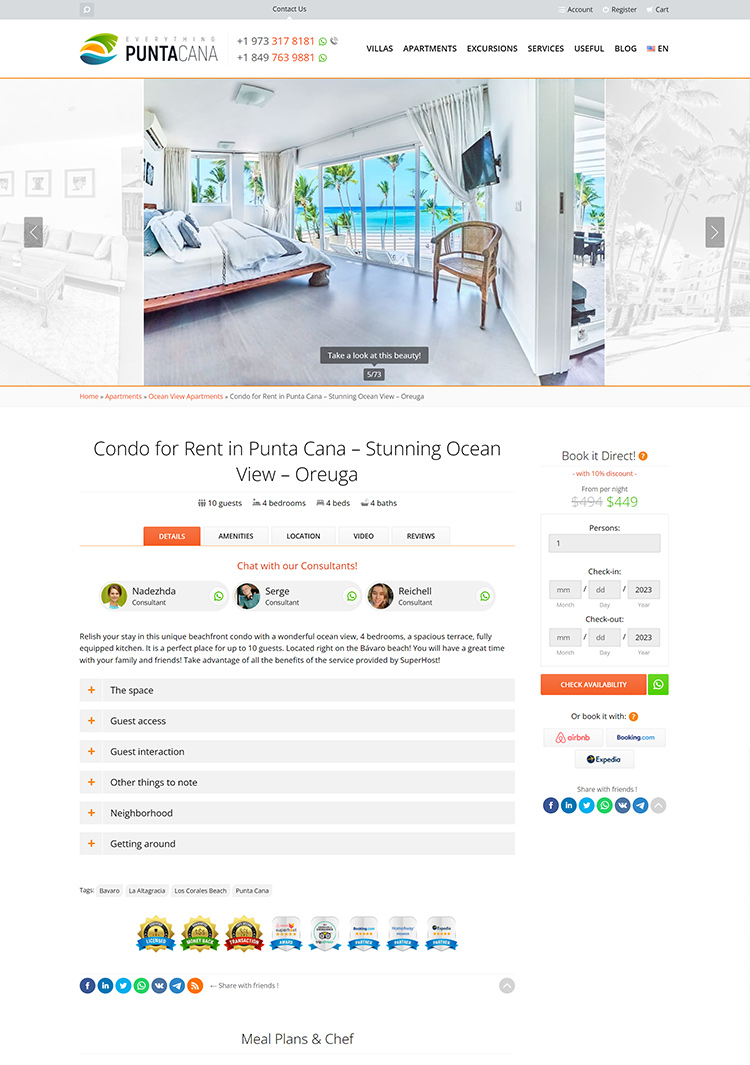
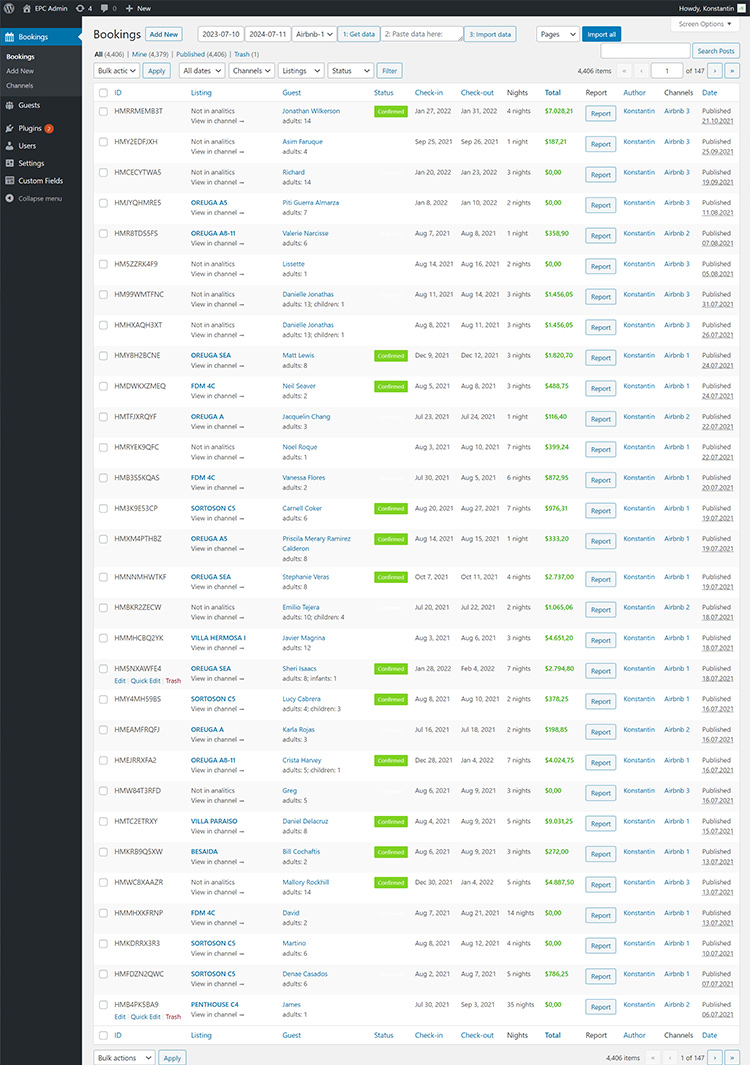





Frequently Asked Questions
What is travel ecommerce?
Travel e-commerce involves the online marketplace for travel services, where you can book hotels, vacation homes, tour packages, and purchase travel accessories.
The aim is to streamline and simplify the process of planning and buying for your travels, making it both more efficient and convenient.
What are the advantages of e-commerce in tourism?
It enables the collection and analysis of data on user behavior, preferences, and conversion rates on your website. This information allows for data-driven decision-making and trend identification, enhancing market understanding.
Why do you need an eCommerce website?
An e-commerce website is crucial for selling travel services online. It broadens your reach beyond traditional physical locations, offers round-the-clock accessibility, and provides comprehensive service information.
Online customer support, secure transactions, and digital marketing tools on your site can help expand your business in the digital era.
What is the use of travel website?
Travel websites serve to inform and facilitate tourists’ needs. They list various services like accommodations, activity descriptions, and competitive pricing. The goal is to offer essential information and services that help tourists plan their trips effectively.
What should a travel website include?
A well-designed travel website should have user-friendly navigation, detailed service descriptions, high-quality visuals, customer feedback, search and filtering tools, secure online booking and payment options, accessible contact details, updated blogs or articles, social media links, and mobile device compatibility.
How much does it cost to build a travel website?
Building a travel website starts at a base cost of $3,750, with final pricing varying according to specific needs, such as extra features or a faster development timeline.
How do I get traffic to my travel website?
Increasing traffic involves using a combination of technical and creative strategies. This includes clean code for a faster, more user-friendly site that search engines prefer.
Implement SEO techniques such as keyword optimization and backlinks to improve rankings in search results. Attracting users with high-quality content, such as travel guides and personal stories, also has an impact.
Why are travel websites important?
Travel websites are vital for detailing your services, providing targeted marketing, and reaching your desired audience effectively.
Essential features for a successful site include an intuitive interface, online booking, comprehensive travel information, advanced search capabilities, mobile friendliness, secure payment options, and analytical tools for insights.
What does a travel website need?
A travel website needs to be easy to use, with clear information on trips and hotels, lots of good photos, and reviews from other travelers. It should let people search easily, book their trip safely, and work well on phones.
Also, having a section for travel tips and connecting with social media can help keep visitors interested and coming back.
Additionally, the website should include clear contact information for support, ensuring users can easily get help when needed.
The design must be responsive, ensuring it looks good on both desktops and mobile devices, since many users book on the go. Integrating secure payment systems is crucial for safe transactions.
Regular updates with fresh content, such as blog posts about travel destinations or travel tips, can attract more visitors and improve search engine rankings. Social media links and features should be used to share content and engage with a wider audience.
Lastly, implementing tools to analyze visitor behavior helps understand what works well and what needs improvement, guiding future updates and strategies.
What are the objectives of a travel website?
The primary objectives of a travel website are twofold: first, to make the booking of flights, accommodations, and tours as straightforward and hassle-free as possible for users.
And second, to furnish users with comprehensive and useful information that aids in planning their trips, from destination insights to travel tips.
By focusing on these objectives, a travel website aims to enhance the overall travel experience from the initial planning stages to the final booking.
This involves not only simplifying the interface for ease of navigation and transaction but also curating content that offers deep dives into destinations, cultural insights, practical travel advice, and recommendations tailored to diverse traveler needs.
Ultimately, the website seeks to be a one-stop digital platform where users can efficiently organize their travels and gather all the information they need to make informed decisions, thereby fostering a more enjoyable and stress-free travel preparation process.
Is WordPress good for eCommerce?
Certainly! WordPress is a great choice for running an online store. By using the WooCommerce plugin, you can easily transform a WordPress website into a comprehensive eCommerce platform.
This setup supports various types of sales, including physical items, digital products, or services like appointments.
WordPress offers a variety of plugins and themes that let you personalize your store and add new features. Its excellent SEO tools can also help improve your site’s visibility in search results.
Plus, there’s a huge community of WordPress users available for support, making it easier to find help when you need it. Whether you’re starting a small local business or aiming to grow into a major online marketplace, WordPress can adapt to your requirements.
How do I manage multiple eCommerce websites?
Running several eCommerce websites successfully can be done by using a single dashboard to simplify management, automating tasks to save time, and maintaining a uniform brand for easier identification.
Improving your site’s search engine ranking, getting help from outside when necessary, keeping your sites regularly updated, and thoroughly training your team are also key strategies that can help your business grow significantly.
How will you develop a good travel website?
We make sure your website is easy to use and understand. This includes straightforward navigation, high-quality pictures, and detailed explanations of what you offer. It’s also important that the site works well on mobile devices since many people use their phones to look up and book travel.
When it comes to booking, we aim for a process that’s easy, safe, and fast to reduce any hassle.
Next, we work on making your site easy to find through search engines by using the right keywords, making images load faster, and ensuring the site itself loads quickly.
Lastly, we use positive feedback from customers to help convince others to book with you. Showing that other people had a great experience is really persuasive.
What are the positive effects of having a travel website?
First, it’s a great platform for highlighting what you have to offer, including exciting places to visit and special tour packages. It lets potential customers look through these options when it suits them, which might lead them to book with you.
Next, it simplifies your booking process. With online booking, you can keep your availability updated live, and it’s convenient for customers to book from anywhere, at any time. Finally, a travel website is an effective marketing tool.
It helps build your brand, can be enhanced for search engines to bring in more visitors, and is an excellent place to showcase customer feedback or reviews.
Tips & Tricks About eCommerce Website
Advanced Features and Integrations for Travel e-commerce Websites
To cater to a global audience, incorporating the right payment gateways is crucial. The leading choices include:
- PayPal: Widely accepted with robust security features.
- Stripe: Supports multiple currencies and offers low transaction fees.
- Square: Known for its real-time currency conversion capabilities.
These platforms play a vital role in offering a seamless purchasing experience. PayPal, for example, with over 200 million active users globally, highlights the significance of choosing a payment gateway that aligns with consumer trust and preferences.
For real-time booking and availability checks, essential components include:
- A dynamic reservation system that interfaces with your inventory in real-time.
- API integrations with providers of accommodation, flights, and activities to instantly update availability.
- Use of popular integration solutions like Amadeus, Sabre, and Travelport.
These steps ensure your website displays up-to-the-minute information, drastically reducing the risk of overbooking and improving customer satisfaction.
Incorporating advanced technologies such as AI and machine learning, alongside the careful selection of payment gateways and real-time booking integrations, can significantly enhance the functionality and user experience of travel e-commerce websites. These strategies are crucial for streamlining operations, driving customer engagement, and boosting sales.
For businesses in the travel sector aiming to establish or enhance their e-commerce presence, focusing on these key integrations and features is not just a technological investment—it’s a direct investment in customer satisfaction and business growth. By offering a secure, efficient, and user-friendly booking experience, businesses can greatly enhance their competitiveness in the global travel market.
To boost your travel e-commerce website’s visibility, consider the following SEO strategies:
- Optimize website speed for faster loading times.
- Ensure the site is mobile-responsive to cater to users on the go.
- Utilize keyword research to target specific travel-related queries.
- Create quality content that answers common travel questions.
- Obtain backlinks from reputable travel blogs and websites to improve your search engine ranking.
It’s noteworthy that websites on the first page of Google capture nearly 95% of web traffic, emphasizing the importance of a solid SEO strategy.
Social media is a crucial platform for boosting bookings, through:
- Showcasing customer testimonials and stunning travel destinations.
- Featuring exclusive deals to entice potential travelers.
- Using visual platforms like Instagram and Pinterest for engaging content.
- Facilitating direct engagement on Facebook and Twitter.
- Implementing targeted ads to reach potential customers based on their interests.
Influencer collaborations can also significantly amplify your reach, often resulting in a spike in bookings.
Effective content marketing tactics include:
- Creating inspiring travel guides and informative blog posts.
- Engaging audiences with video content and drone footage of destinations.
- Incorporating user-generated content to add authenticity.
- Optimizing content for search engines to increase visibility.
- Utilizing email newsletters to feature special promotions and new content.
By effectively leveraging SEO, social media, and content marketing, travel e-commerce websites can attract more visitors and convert them into customers. These strategies not only enhance the website’s online presence but also build trust and engagement with the target audience, ultimately leading to increased bookings and revenue.
The forefront of UX/UI design in travel websites includes:
- Simplicity and minimalist design for easy navigation.
- Immersive imagery with high-quality photos and videos.
- Interactive elements like 360-degree views and virtual tours.
- Personalization with AI-driven recommendations tailored to user preferences.
These trends aim to provide an engaging and seamless user experience, enhancing the journey of discovering and booking travel destinations.
To make your travel website accessible and mobile-friendly, consider the following:
- Adopt a responsive design that adapts to different screen sizes.
- Use large fonts and easily clickable buttons for better readability and interaction.
- Incorporate accessibility features, such as keyboard navigation and alt text for images.
- Regular testing with accessibility tools across various devices to ensure universal usability.
Enhancing accessibility not only improves user experience but also contributes to better SEO performance.
To maximize conversions with your travel packages and deals:
- Use clear and concise descriptions with high-quality visuals.
- Highlight key benefits and unique selling points prominently.
- Include customer reviews and ratings for added trust.
- Create urgency with limited-time offers and countdown timers.
- Ensure transparent pricing to avoid surprises at checkout.
Embracing the latest UX/UI design trends, focusing on mobile-friendliness and accessibility, and adopting best practices for displaying travel packages and deals are pivotal in delivering an outstanding user experience. These strategies enhance engagement, ease of use, and satisfaction, driving conversions and fostering customer loyalty in the competitive travel industry.
To gauge your travel website’s success, monitor these essential metrics:
- Website traffic and the source of this traffic (organic search, social media, referrals).
- Bounce rate to understand user interest and content relevance.
- Conversion rate to measure the effectiveness of your call-to-actions and user journey.
- Average session duration and user engagement levels to gauge content engagement.
- Performance of specific pages, such as booking and special offers pages, to identify user behavior patterns.
Additionally, customer satisfaction scores and feedback provide valuable insights into the overall user experience and areas for improvement.
Analytics can significantly improve customer engagement and sales by:
- Identifying trends in user behavior to tailor marketing strategies and website content.
- Optimizing pages with low conversion rates through engaging content or clearer calls to action.
- Employing A/B testing to determine changes that increase engagement and sales.
- Personalizing the user experience based on past behavior to boost conversions.
- Implementing targeted promotions and retargeting campaigns to re-engage visitors.
Leveraging analytics and performance monitoring is vital for understanding user behavior, evaluating marketing strategy effectiveness, and making informed decisions to enhance customer engagement and increase sales. By focusing on key performance metrics and utilizing analytics tools, travel websites can continuously refine their offerings, ensuring they meet the needs and preferences of their target audience effectively.
Chatbots and AI enhance customer service by:
- Providing instant responses to common queries around the clock.
- Handling multiple inquiries simultaneously, thus reducing wait times.
- Offering personalized recommendations based on user preferences and past interactions.
- Assisting in the booking process and providing travel advice and updates.
This technology improves user satisfaction by ensuring efficient and personalized support.
To effectively manage online customer reviews and feedback:
- Respond promptly to all feedback, acknowledging both positive and negative comments.
- Show appreciation for feedback and address concerns with empathy.
- View negative feedback as an opportunity to improve services and showcase commitment to satisfaction.
- Encourage more reviews by sending follow-up emails after a customer’s trip.
- Display reviews prominently on your site to provide social proof and build trust.
Leveraging chatbots and AI for customer support, along with adhering to best practices in managing online reviews and feedback, significantly improves the quality of customer service on travel websites. These measures not only enhance the support system but also build trust, foster positive customer relationships, and lead to increased satisfaction and loyalty. This approach ensures a more responsive, efficient, and engaging customer service experience, crucial for the success of any travel e-commerce platform.
To effectively localize your travel e-commerce website:
- Translate and adapt content to the languages of your target markets, considering cultural nuances.
- Customize currency, payment methods, and recognize local holidays or events.
- Use geo-targeting to personalize content and promotions based on user location.
- Offer customer service in local languages and employ local SEO strategies for better visibility.
While tools like Google Translate provide a starting point for translation, professional services are recommended for greater accuracy and cultural sensitivity.
Strategies to engage international customers include:
- Optimizing your site for international SEO with hreflang tags and regional URLs.
- Targeting specific countries or regions through social media marketing.
- Collaborating with local influencers and travel bloggers to enhance visibility and credibility.
- Offering deals tailored to international travelers and supporting multiple currencies and payment methods.
Localizing your travel e-commerce website and employing strategic approaches to attract international customers are crucial for expanding your global reach. Adapting to the specific preferences and requirements of various markets enhances your online presence, making it more inclusive and appealing to customers worldwide. This not only drives more bookings but also significantly increases revenue from international markets, marking a pivotal step in the growth and scalability of your travel e-commerce venture.
Show all ↓
Top Benefits of eCommerce Website
Global Reach
Expand your customer base by attracting travelers from all around the world, opening up new markets and opportunities for your business.
Increased Sales Through SEO
Optimize your site for search engines to attract more organic traffic, making it easier for potential customers to discover your offerings.
Personalized Experiences
Offer customized travel packages and promotions based on user preferences and past behavior, enhancing engagement and loyalty.
24/7 Availability
Your services are available around the clock, allowing customers to book their travel plans whenever it's most convenient for them.
Seasonal Deals and Promotions
Leverage eCommerce to offer strategic discounts during off-peak seasons, filling up inventory and saving costs.
Enhanced Market Access
Partner with well-known third-party sites to gain trust and extend your reach, funneling more customers directly to your offerings.
Influencer Partnerships
Collaborate with travel bloggers and social influencers to tap into new audiences and build credibility through trusted sources.
Engaging Content Strategy
Develop compelling and informative content to educate and inspire potential travelers, positioning your brand as an authority.
Advanced Ecommerce Tools
Utilize the latest eCommerce tools and technologies to provide a seamless booking experience, ensuring customer satisfaction and repeat business.
24/7 Customer Support
Provide instant support and answer queries at any time with AI-driven chatbots and customer service teams, improving the overall user experience and satisfaction.
Data-Driven Insights
Utilize analytics to gain valuable insights into customer behavior and preferences, enabling you to make informed decisions and tailor your offerings for better results.
Exclusive Member Benefits
Offer loyalty programs and exclusive benefits for repeat customers, encouraging long-term engagement and repeat bookings.
Multi-Platform Integration
Ensure a seamless user experience across all devices, from mobile to desktop, enhancing accessibility and convenience for all users.
Dynamic Social Media Marketing
Utilize social media platforms to target and engage with potential customers, driving more traffic and bookings.
Show all ↓
Reasons to Choose WooCommerce as
an e-Commerce Platform
Order eCommerce Website
For any aspects of our services, please don’t hesitate to contact us. We are here to help and always eager to hear from you!











